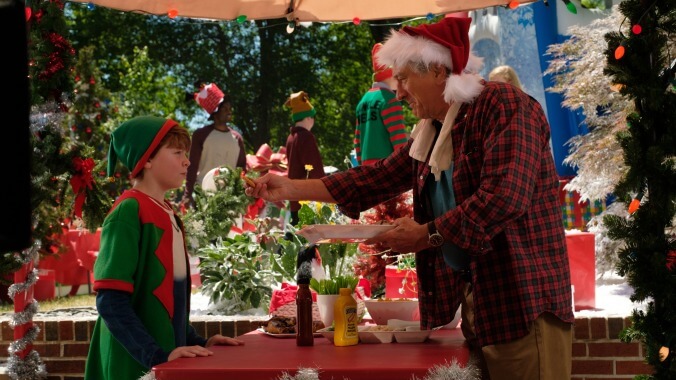Robert De Niro family flick The War With Grandpa buries a cute premise under dumb pratfalls

Note: The writer of this review watched The War With Grandpa from home on a digital screener. Before making the decision to see it—or any other film—in a movie theater, please consider the health risks involved. Here’s an interview on the matter with scientific experts.
First things first: different grandpa. Not the dirty one. Indeed, Robert De Niro more or less plays Squeaky Clean Grandpa this time around, headlining a movie adapted from a 1984 young-adult novel (by Robert Kimmel Smith) and squarely aimed at barely pubescent viewers. Sure, there are some hijinks involved—that’s in the nature of combat, and Smith’s very cute premise imagines a series of good-natured intergenerational territorial skirmishes. Unfortunately, director Tim Hill (Alvin And The Chipmunks, Hop), working from a script by Tom J. Astle and Matt Ember (Home, Get Smart), decided to go big and broad rather than low-key and charming, ensuring that only the most recent generation will have a good time.
This War’s equivalent of Fort Sumter or the assassination of Archduke Ferdinand is the arrival of Ed (De Niro) at the home of his daughter, Sally (Uma Thurman), who’s weary of driving two hours each way to deal with his elder-care issues—most of which are the result of Ed’s temper, not of any infirmity. Ed refuses to live in a facility, but reluctantly agrees to stay with the family, which gives him the room that had previously belonged to Peter (Oakes Fegley), his roughly 13-year-old grandson. Peter, however, is none too happy about having been relegated to the attic, with its swooping bats and cord-chewing rats. In a fit of pique, he submits a formal declaration of war against Ed, who’s just ornery and understanding enough to take it seriously. Rules of engagement are drawn up (no collateral damage, no telling), following which both one-man armies open fire with pranks designed to induce misery and eventual surrender.
There’s actually something quite touching about this idea, which is predicated on Ed’s need for a distraction following the recent death of his wife, as well as his willingness to respect Peter’s frustration at losing valued personal space, which represents everything to a kid. De Niro’s definitely coasting here, but he successfully sells the occasional tender moment, as when Ed shows Peter’s button-cute younger sister, Jennifer (Poppy Gagnon), a jar full of marbles, explaining that each one was found when he was digging the foundation for a house he built over the course of his long career in construction. And it’s a reasonably funny joke when Ed tries to pick up the jar, so that he can give Jennifer a marble, and finds that Peter has glued it to the desktop, causing it to shatter and spill marbles all over the floor. But that’s not enough for The War With Grandpa, which not only has Ed fall after stepping on the marbles (okay, sure), but does so with Home Alone-level gusto: arms flailing, heels scrabbling, sailing five feet into the air horizontally and landing flat on his back like Charlie Brown after Lucy pulls the football away yet again.
That’s par for the course with this aggressively boisterous but rarely funny comedy, which keeps pushing its gags one step too far. Not bad: Peter substituting sealing foam for Ed’s shaving cream, so that the “lather” instantly hardens into a shell around his jaw. Not necessary: Ed’s son-in-law (Rob Riggle) walking into the bathroom and startling Ed, who snarls through the foam, setting off a chain reaction of screams that ends with Ed’s towel falling down and exposing his junk (just to the son-in-law, thankfully, not to us; this happens again later in the film, incidentally). A geezers vs. whippersnappers dodgeball game inevitably sees one of the male players take a ball to the nuts, and if you’ve longed to hear both Christopher Walken (appearing opposite De Niro for the first time since The Deer Hunter) and Cheech Marin utter the phrase “Hells yeah,” well, your dream has come true. Thurman, trapped in the bland role of a generic mom, occasionally gets to mug it up in a running gag that sees Sally throw first coffee and then a live snake at the same glowering motorcycle cop. (Don’t ask.) There’s a pleasing kernel of genuine warmth glowing at the heart of this movie, but it’s been heavily insulated—almost buried—by juvenile silliness. One could argue that this merely echoes the family dynamic, but your tolerance for buffoonery will still need to be quite high.